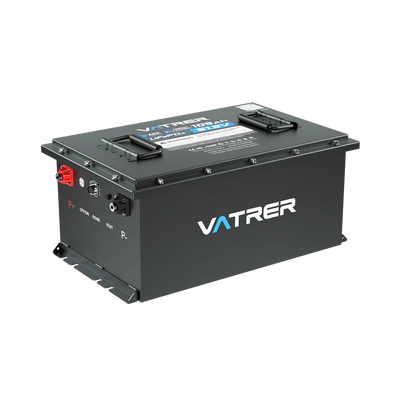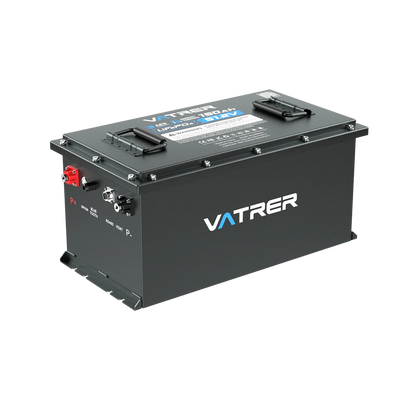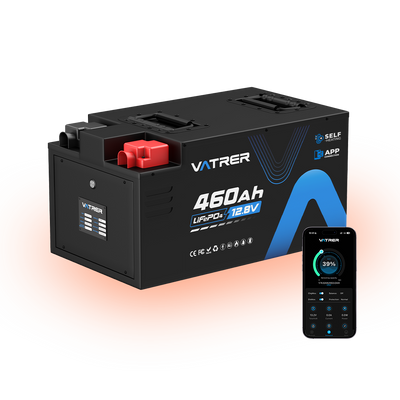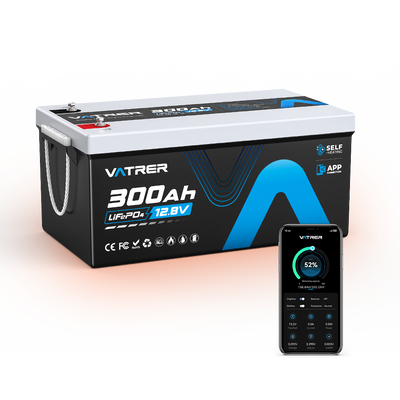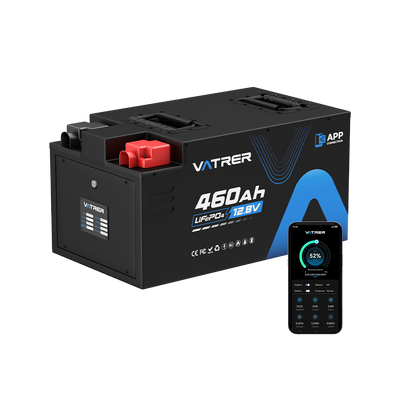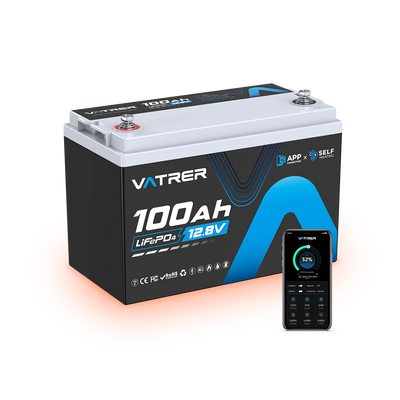Where To Buy Golf Cart Batteries
Reading time 6 minutes
When your golf cart starts losing power faster than usual or takes much longer to charge, it's often a sign that your battery needs to be replaced. Knowing where to buy golf cart batteries and which type suits your vehicle is essential to getting reliable performance and long-term value.
This guide walks you through everything you need to know: from understanding battery types and purchase options to installation tips and upgrade considerations.

Why It Matters to Know Where to Buy Golf Cart Batteries
Your golf cart battery isn't just another component, it's the energy source that powers every ride. Whether you use your cart for daily transportation, golf, or utility work, choosing the right battery supplier affects more than price. It determines performance, longevity, and peace of mind.
Modern owners have more choices than ever: local dealers, big-box retailers, or online stores. However, not every source guarantees quality or compatibility. Therefore, we will provide you with detailed information on where to find reliable golf cart batteries nearby, and what to check before purchasing, especially if you are upgrading to lithium batteries.
Understanding the Role of a Golf Cart Battery
The golf cart battery serves as the main power unit, converting stored energy into motion and supplying electricity for lights, controllers, and accessories. Its voltage and capacity determine how far and how smoothly your cart can travel on a single charge.
| Battery Voltage | Common Use Case | Typical Range | Average Runtime |
|---|---|---|---|
| 36V | Older carts, lighter loads | 20–25 miles | 3–4 hours |
| 48V | Modern carts, higher power | 30–50 miles | 5–6 hours |
| 72V | High-performance or lifted carts | 50+ miles | 6–8 hours |
Tip: If your cart feels sluggish or struggles on inclines, it may not be a mechanical issue but rather reduced battery performance due to aging or an imbalance across cells.
Types of Golf Cart Batteries and Which to Choose
Not all golf cart batteries are created equal. Understanding the different types helps you choose one that matches your performance goals, maintenance preference, and budget.
| Type | Lifespan | Maintenance | Weight | Charging Time | Cost Range |
|---|---|---|---|---|---|
| Flooded Lead-Acid | 3–5 years | High | Heavy | 8–10 hrs | $600–$900 |
| AGM | 4–6 years | Low | Moderate | 6–8 hrs | $800–$1,000 |
| Gel | 5–7 years | Low | Moderate | 8–9 hrs | $900–$1,100 |
| Lithium (LiFePO4) | 8–10+ years | None | Light | 4–5 hrs | $1,200–$2,000 |
Tip: While the lithium golf cart battery has a higher upfront cost, the long-term savings in maintenance and replacement make it the most cost-effective option.
Flooded Lead-Acid (FLA)
- The oldest and most affordable option.
- Requires regular watering, cleaning terminals, and proper ventilation.
- 3-5 years lifespan.
- Heavier, slower charging, and sensitive to temperature swings.
AGM (Absorbent Glass Mat) Lead-Acid
- Sealed design, no water maintenance needed.
- More durable than flooded types, with better vibration resistance.
- Slightly higher cost but improved reliability.
Gel Lead-Acid
- Electrolyte in gel form reduces leakage and improves performance in extreme temperatures.
- Charges slower and is more expensive than AGM.
Lithium (LiFePO4) Batteries
- Lightweight and maintenance-free.
- Charges up to 70% faster than lead-acid.
- Delivers over 4,000 charge cycles.
- Built-in BMS (Battery Management System) and low temperature for safety and efficiency.
- Best option for long-term performance, fast charging, and consistent power output.
Where to Buy Golf Cart Batteries: Local and Online Options
When searching for golf cart batteries near me, you have several buying options depending on your budget, maintenance needs, and preferred level of support. Below are the four main channels where American customers typically purchase their new or replacement golf cart battery.
| Channel | Ideal For | Key Advantages | Key Limitations |
|---|---|---|---|
| Local Dealers | Hands-on buyers | Installation, local warranty | Higher cost |
| Retail Chains | Budget-conscious users | Easy pickup, low price | Limited lithium stock |
| Online Marketplaces | Self-installers | Variety, reviews, fast shipping | Warranty uncertainty |
| Brand Websites | Upgrade-focused buyers | Genuine products, best support | Shipping time |
a. Local Golf Cart Dealers or Repair Shops
Best for owners who prefer in-person consultation, installation service, and warranty support.
Pros
- Technicians can test your old battery and recommend a compatible replacement.
- Installation and cable setup are handled on-site.
- Some offer trade-in discounts for used batteries.
Cons
- Prices are usually 10-15% higher due to labor and service fees.
- Selection may be limited to specific brands.
Examples
- Golf Cart King (Texas): Authorized dealer for Club Car, EZGO, and Yamaha.
- Battery Source (Florida/Georgia): Offers both lead-acid and lithium replacements.
- Batteries Plus Bulbs (nationwide): Carries Trojan, Duracell, and select lithium models with in-store installation.
b. Retail Chains
Best for casual owners seeking affordable lead-acid batteries with convenient pickup.
Pros
- Competitive pricing and wide availability.
- Easy to access for standard flooded or AGM models.
- Return and warranty handled through store policy.
Cons
- Limited lithium battery selection.
- Staff may lack expertise in golf cart systems.
Examples
- Walmart Automotive Center: Stocks EverStart 6V and 8V batteries.
- Sam's Club: Bulk purchase options for fleet operators.
- Costco: Interstate and Duracell deep-cycle batteries.
C. Online Marketplaces
Best for experienced owners comparing prices or sourcing specific models quickly.
Pros
- Wide selection across multiple brands.
- Easy to compare specifications and read customer reviews.
- Door-to-door shipping convenience.
Cons
- Warranty and authenticity can vary by seller.
- Some listings may feature refurbished or gray-market products.
Examples
- Amazon: Sells various brands of lithium models.
- eBay: Useful for discontinued or rare replacement sizes.
Tips: Always check “Ships from and sold by” to confirm authorized dealers.
d. Brand Official Websites (Recommended)
Best for owners upgrading to lithium batteries or requiring verified specs, support, and warranty coverage.
Pros
- Guaranteed authentic products directly from the battery manufacturer.
- Access to full technical documentation and installation guides.
- Dedicated support for warranty claims or troubleshooting.
- Latest production batches and certified safety standards (UL, CE, UN38.3).
Cons
- Online ordering is supported only, and there will be a waiting time for delivery. (Some brands offer local warehouse pickup.)
Examples
- Vatrer Battery offers 36V, 48V, and 72V LiFePo4 golf cart battery conversion kits, supporting features such as Bluetooth monitoring and fast charging. With local warehouses in each state, online orders can be picked up in person, reducing waiting time.
- Trojan Battery is known for its high-quality deep-cycle lead-acid battery series.
Why Buying a Battery from a Brand Website Is Often the Best Choice
Choosing a trusted manufacturer's website ensures you get a verified, warranty-protected battery with accurate specifications and safety certifications (UL, CE, UN38.3). Brands like Vatrer Battery provide:
- Detailed product specs and compatibility charts.
- Technical support for installation and setup.
- Access to genuine chargers and accessories.
- Firmware or app support for Bluetooth monitoring and BMS data.
Buying directly also avoids middlemen, ensuring fresher production batches and proper handling from warehouse to customer.
What to Check Before Replacing Your Golf Cart Battery
Replacing your old golf cart battery requires preparation to prevent damage or injury.
Checklist
- Disconnect all power before removal.
- Wear protective gloves and eyewear.
- Label cables to maintain polarity.
- Clean corrosion from terminals before reinstallation.
- Check mounting brackets for rust or cracks.
- Use the correct charger for the new battery chemistry.
Tips
- Never mix old and new batteries in one system.
- Dispose of old lead-acid batteries properly, most retailers offer recycling programs.
What To Consider When Upgrading a Golf Cart With a Lithium Battery
Switching to lithium batteries is one of the best upgrades for your golf cart, but it requires proper planning.
- Voltage Compatibility: Ensure your system (36V, 48V or 72V) matches the new pack.
- Charger Compatibility: Lithium batteries need dedicated LiFePO4 chargers (usually 58.4V for 48V systems).
- BMS Integration: Built-in systems prevent overcharge, deep discharge, or overheating.
- Weight and Mounting: Lithium batteries are up to 70% lighter, rebalancing may be needed for ride stability.
- Performance Gain: Expect faster charging, consistent torque, and longer range per charge.
A Vatrer 48V 105Ah lithium battery can deliver up to 50 miles on a single charge, lasting 10 years with minimal maintenance.
Conclusion
Buying the right golf cart battery involves more than just finding a low price, it's about ensuring performance, safety, and reliability. Buying from local stores is very convenient, while buying from the brand's official website offers verified specifications, professional support, and more added value.
If you're ready to upgrade, consider Vatrer Battery's line of lithium batteries designed for golf carts, UTVs and solar systems. Our LiFePO4 models offer 4,000+ cycles, Bluetooth monitoring, and built-in protection systems delivering dependable power for every round, every ride, and every season.
Final Tip: Before buying, review your cart's voltage, measure battery dimensions, and compare available lithium options. A well-informed purchase today means fewer replacements, smoother rides, and years of reliable performance.
Share












































































